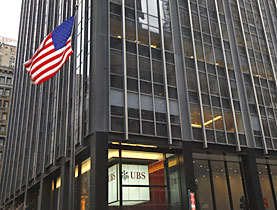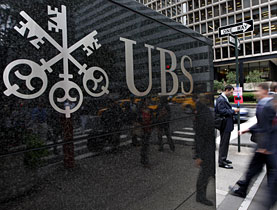Panic sets in for UBS clients in America

UBS customers in the United States are coming forward to declare their secret bank accounts amid fear of serious financial and legal repercussions.
Some US lawyers say calls to their offices have shot up since the Swiss banking giant announced last Wednesday that it would hand over confidential details of some 250 clients the American tax authorities suspect of tax evasion.
“People are looking for the ability to sleep at night,” Robert McKenzie, a Chicago attorney, told swissinfo.
McKenzie is representing 14 clients with accounts at Swiss banks, such as UBS and Credit Suisse, who are seeking tax settlements.
In the past few days McKenzie has received several calls from concerned account holders wishing to disclose their Swiss bank accounts to the US tax authorities, in the hope of leniency.
On Thursday, US authorities filed a civil lawsuit in Miami demanding that UBS identify roughly 52,000 Americans whom the Internal Revenue Service (IRS) suspects of secretly holding a total of at least $14.8 billion (SFr17.2 billion) in cash and securities.
Even before the Department of Justice broadened its investigation last week, the IRS was receiving a deluge of calls from taxpayers worried about undisclosed foreign accounts, according to Dow Jones Newswires.
The IRS is encouraging US taxpayers with such accounts to come forward and “get right” with the government.
Heavy price
“Taxpayers should talk to a tax professional and come forward under our voluntary disclosure process. Having the IRS find you could mean a much heavier price than coming forward on your own,” IRS Commissioner Doug Shulman said in a statement last week.
That heavy price includes penalties as high as 50 per cent of the amount in the secret foreign bank account, applicable to each year of non-disclosure on US federal tax statements.
“Timeliness is critical. Those who ignore this window of opportunity may well find themselves in prison for tax evasion,” Charles Rettig, a lawyer at Hochman, Salkin, Rettig, Toscher & Perez in Beverly Hills, California, told swissinfo.
Rettig’s firm represents more than 100 clients who have or are in the process of disclosing their secret foreign account details to the IRS.
He added that it has taken considerably longer than anticipated for many of his clients to receive the tax documents they requested from UBS.
Rettig said many have filed so-called FBARs (Report of Foreign Bank and Financial Account) with the IRS, while waiting for the additional information from UBS.
Embarrassed and worried
McKenzie said his clients have had different reactions to last week’s news depending on their circumstances. “It’s embarrassing for some and downright worrying for others,” he said of the wealthy and upper middle class clients he has retained.
One of his clients, a business owner, had a Chinese supplier issue invoices for double the real amount, he said. The Chinese supplier took half of the amount, and deposited the rest in the business owner’s UBS bank account. McKenzie said it was a way of lowering the company’s profits in the US, and therefore taxes as well.
He added that many of his other clients had less sinister motives and had opened secret bank accounts due to a “lack of faith in the US banking system”.
“These people wanted to have their money in the stable Swiss banking system,” he said.
“Compassion”
One such client, an 86-year-old man who had deposited a few hundred thousand dollars in a secret UBS account the late 1970s, called McKenzie’s office last week panicking about his future.
“Does this mean I’m going to jail?” the man asked. McKenzie assured his client, whose case is in “active negotiations”, that he would be spared prison.
“The IRS is vicious but not at that level. Once you reach 80 there will be some compassion.”
Rettig, however, is not so sure. He says that taxpayers who believe the IRS will not find them or that UBS – which said it would fight the case against them – may not turn over all the names could be sorely mistaken.
“Some may have considerable time – while incarcerated – to think about their decision not to come into compliance when they had sufficient warning and an opportunity to do so,” he said.
swissinfo, Karin Kamp in New York
People wishing to dodge paying taxes on their assets can do so by three means: avoidance, evasion and fraud.
Avoidance is the legitimate means of structuring finances so they don’t fall under the scope of taxable assets. This can be done, for example, by setting up a trust fund or by changing country residence or nationality.
Evasion is the deliberate concealing the true state of assets from the tax authorities – in other words, lying about the extent of your assets. This is a civil offence in Switzerland and some other countries, such as Austria and Liechtenstein, but criminal in most states.
The main distinction between evasion and fraud is that the perpetrator tells lies on official documentation. Unless tax fraud can be proved, Swiss banks are not obliged to hand over details of client assets to investigators. In some cases this information is needed before fraud can be established in the first place.

In compliance with the JTI standards
More: SWI swissinfo.ch certified by the Journalism Trust Initiative











You can find an overview of ongoing debates with our journalists here . Please join us!
If you want to start a conversation about a topic raised in this article or want to report factual errors, email us at english@swissinfo.ch.